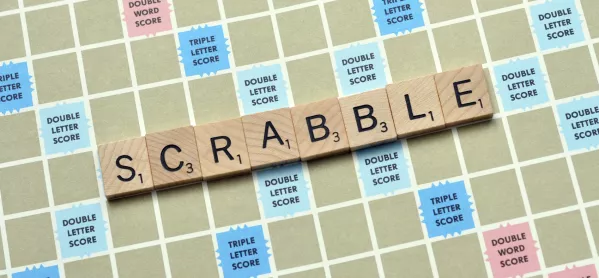Language changes with the years. We no longer write as they did a hundred years ago; words and phrases I used as a teenager would puzzle my students.
What doesn’t change is the need for our pupils to learn to use language effectively; to choose the appropriate words for the occasion.
Scrabble caused a stir this week by approving a raft of new terms for its wordlist. Apparently ‘lolz’, ‘emoji’ and ‘twerking’ will now be permitted on its boards.
Scrabble’s decision is a timely reminder that, as new words gain acceptance in common parlance, we need to take more time to show pupils how and when to use them.
I have no problem with Scrabble adopting new words. Indeed, it is good to see the rules reflecting the way in which social media are enlarging the vocabulary of English. The Scrabble dictionary determines the game, not ‘the language’. Its rule-makers can decide to allow any words they want.
There is, however, a challenge in the classroom, highlighted by the additions to Scrabble. As new contexts and media give birth to new vocabulary, it requires a greater effort to grasp which words are appropriate in which circumstances. Learning what does, and does not, work in exams, essays applications for jobs is an essential skill in the modern world, as important as knowing times tables.
As children spend more time conversing with each other on social media, it is only natural the language they use will spill over into their schoolwork and later into their professional lives.
All teachers need to be alert to this challenge. It is not just the business of the English teacher. For schools to produce well-rounded young people who appreciate and enjoy language and know how to use it effectively, teachers in all subjects have to work on the quality of writing.
Appropriate use of language lies at the heart of good communication. Pupils cannot expect to get away with using ‘tuneage’ in a music essay to describe a song they like.
We need to work with our students and their world of communication. It is not helpful simply to condemn all new words as ‘bad English’, or to accept them all as creatively progressive. The argument can be summed up as ‘to each its own place’. ‘Laughter’ is appropriate in formal writing, whereas ‘lolz’ might be acceptable - even preferable - on twitter.
Closely related to new words is the matter of new spellings. Deciding which words go into spelling tests now takes on even more importance. Alongside teaching the distinction in spelling (and meaning) between ‘there’ and ‘they’re’ we now have to address competing spellings of many common words. ‘Thanx’ works in a text message, but woe betide student who includes it in a letter applying for a job.
Scrabble has done the teaching profession a favour by reminding us how essential it is to teach discrimination in the use of competing words and spellings: when it’s appropriate to describe something as ‘ridic’ and when ‘ridiculous’ is needed. It is our job as educators to articulate the argument over language innovations.
A word or spelling may be allowable in Scrabble and effective on twitter; but when it comes kinds of writing such as essays or job applications, other standards apply. We teachers expect it, exam boards expect it, and employers expect it, too.
Dr Mark Garner is Co-ordinator of Applied Linguistics at the University of Roehampton in London
